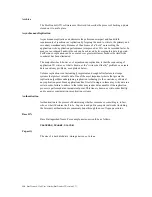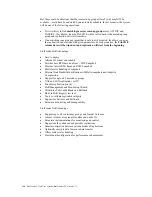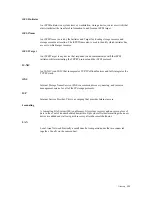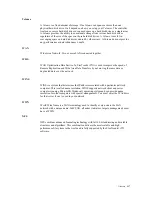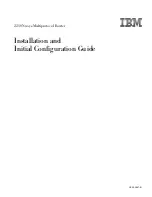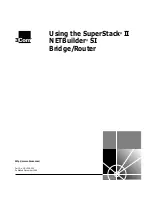
Glossary
323
iFCP
Internet Fibre Channel Protocol. iFCP is a TCP/IP-based protocol for interconnecting
Fibre Channel storage devices or Fibre Channel SANs using an IP infrastructure to
complement or replace Fibre Channel switching and routing elements.
ILM
Information Lifecycle Management. Information Lifecycle Management (ILM) is an
increasingly important function of storage systems. Since information systems are usually
used continuously over several years, it becomes necessary to differentiate old data from
new, and give priority to new data over old data. An administrator may want to move old
data to cheaper, lower-performance media, and move frequently used new data to faster
media.
Snapshots have the natural advantage of having time information inbuilt into them, thus
making them an ideal choice around which to build an ILM implementation. Snapshots
can be leveraged in ILM implementations to timestamp data and migrate it accordingly,
and some ILM features of storage systems also use snapshots to provide granular block
level tracking and management, and automatic data classification by storage type, RPM,
size, RAID level, and so on. In this way we can see several examples of how snapshots
are leveraged in storage systems to enhance backups and ILM, making them more
efficient and effective, increasing data continuity, and contributing to bandwidth and cost
reduction.
Internet
A global wide area network connecting millions of computers.
IP Address
A 32-bit numeric address written as four numbers separated by periods. Each number can
be zero to 255.
IP SAN
Internet Protocol Storage Area Network. Basically, a storage device that is purposely
built as a robust block-level networked storage device. Suitable for server consolidation,
prime storage, and back-up. It has all the benefits of NAS (Network Attached Storage),
builds on SCSI and Ethernet technologies, no learning curve, no expensive components,
more affordable SAN infrastructure, centralized management, no downtime to add
capacity, eliminates back-up window, snapshot, replication, failover, increases operating
distance, and can utilize network management tools. Limitations mostly include security
concerns (security concerns are more network-related and are not IP SAN-specific).
Summary of Contents for ManageTrends 2.7
Page 18: ...StorTrends 1300 User s Guide StorTrends iTX version 2 7 xviii...
Page 24: ...StorTrends 1300 User s Guide StorTrends iTX version 2 7 6...
Page 33: ...Chapter Two Chassis Set Up 15 Accessing the Inside of the System...
Page 60: ...StorTrends 1300 User s Guide StorTrends iTX version 2 7 42...
Page 64: ...StorTrends 1300 User s Guide StorTrends iTX version 2 7 46...
Page 70: ...StorTrends 1300 User s Guide StorTrends iTX version 2 7 52...
Page 100: ...StorTrends 1300 User s Guide StorTrends iTX version 2 7 82...
Page 106: ...StorTrends 1300 User s Guide StorTrends iTX version 2 7 88 Control Panel...
Page 236: ...StorTrends 1300 User s Guide StorTrends iTX version 2 7 218...
Page 256: ...StorTrends 1300 User s Guide StorTrends iTX version 2 7 238...
Page 277: ...Appendix E Replication Overview 259 Snap Assisted Replication Navigating with ManageTrends...
Page 281: ...Appendix E Replication Overview 263 Replication SAR view Primary Box SAR view Secondary Box...
Page 285: ...Appendix E Replication Overview 267 After Failover Operation in Secondary Box...
Page 300: ...StorTrends 1300 User s Guide StorTrends iTX version 2 7 282...
Page 308: ...StorTrends 1300 User s Guide StorTrends iTX version 2 7 290...
Page 330: ...StorTrends 1300 User s Guide StorTrends iTX version 2 7 312...
Page 356: ...StorTrends 1300 User s Guide StorTrends iTX version 2 7 338...






